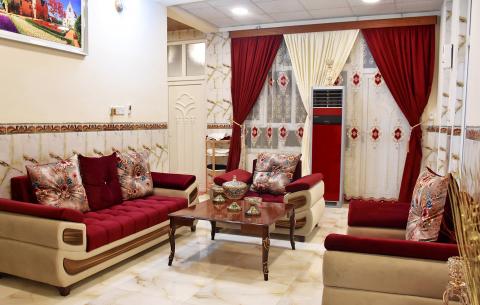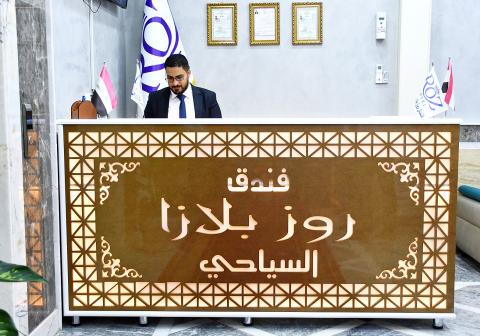The opening of a new hotel is posing a challenge to tribal customs in western Iraq’s Anbar province, where locals traditionally welcome outsiders into their homes.
In the heart of Ramadi, the provincial capital, a tall building is lit up with neon lights. “Rose Plaza Hotel” reads a bright sign in Arabic and English. The 80-bed hotel, built by a young Iraqi businessman, has caused a stir in Anbar, the vast desert province to the west of Baghdad that extends to the borders with Syria, Jordan and Saudi Arabia. Wearing a suit and with his hair slicked back, hotelier Mohammed Kassar stands ready to defend his project. “We are the province of generosity and hospitality,” said the 29-year-old.
“But it’s a joke that a province which covers a third of Iraq, looks out onto three countries and is a commercial hub, doesn’t have a hotel.”

Photo: AFP
Anbar has come far.
A longtime bastion of the anti-US insurgency, it was later overran by the Islamic State (IS) group and became off-limits to tourists or investors on business trips.
But since Ramadi was retaken by Iraqi authorities in 2016, reconstruction, new housing and commercial projects have sprung up, attracting entrepreneurs from across Iraq. Louai Rafe, an Iraqi businessman, was happy to have found Rose Plaza.

Photo: AFP
He thought he could finish some administrative work in Anbar and return the same day to the capital Baghdad, 100km away. But the work took longer than he expected and he decided to book into the new hotel.
“Whenever I came here, I used to sleep at a friend’s house, and I was embarrassed to bother him again,” said Rafe.
“This hotel is really welcome, it makes everyone’s life easier.”
‘DESTROY OUR REPUTATION’
But in Anbar, life is governed by the region’s tribes and their ancestral customs.
A sense of hospitality is paramount, with any outsiders being invited to eat a hearty meal and stay overnight in a resident’s home.
Houses are even built with such a welcome in mind, as the diwaniya or reception hall must be the largest and most impressive room.
This remains true even if it means cutting down on space for the family.
The only previous attempt to open a hotel in Ramadi was a failure, evident from the unfinished and abandoned building in the city center. The Turkish firm behind the hotel was forced to abandon the project in 2014, when IS overran the city. Residents jest that even the jihadists stayed away from the building.
But some Anbar residents are keen to take advantage of the new hotel, such as 28-year-old Mohammed Ahmed who has reserved a room for his honeymoon. “I didn’t have anywhere to go and the hotel is a good alternative,” said Ahmed, his beard neatly trimmed and wearing a crisp white shirt.
The owner also aims to attract business clients, holding out hope to welcome delegates for reconstruction conferences and summits on Iraq’s post-IS future.
But for some residents, the arrival of the hotel remains a threat to the region’s customs.
“These hotels never exited in the traditions of our fathers and our grandfathers,” said Sheikh Ibrahim Khalil al-Hamed, a 52-year-old tribal dignitary.
Hamed, wearing a white Bedouin scarf and black robe, said the tribes have always been known for welcoming visitors.
“These hotels destroy our reputation,” he said.

June 2 to June 8 Taiwan’s woodcutters believe that if they see even one speck of red in their cooked rice, no matter how small, an accident is going to happen. Peng Chin-tian (彭錦田) swears that this has proven to be true at every stop during his decades-long career in the logging industry. Along with mining, timber harvesting was once considered the most dangerous profession in Taiwan. Not only were mishaps common during all stages of processing, it was difficult to transport the injured to get medical treatment. Many died during the arduous journey. Peng recounts some of his accidents in

A short walk beneath the dense Amazon canopy, the forest abruptly opens up. Fallen logs are rotting, the trees grow sparser and the temperature rises in places sunlight hits the ground. This is what 24 years of severe drought looks like in the world’s largest rainforest. But this patch of degraded forest, about the size of a soccer field, is a scientific experiment. Launched in 2000 by Brazilian and British scientists, Esecaflor — short for “Forest Drought Study Project” in Portuguese — set out to simulate a future in which the changing climate could deplete the Amazon of rainfall. It is

What does the Taiwan People’s Party (TPP) in the Huang Kuo-chang (黃國昌) era stand for? What sets it apart from their allies, the Chinese Nationalist Party (KMT)? With some shifts in tone and emphasis, the KMT’s stances have not changed significantly since the late 2000s and the era of former president Ma Ying-jeou (馬英九). The Democratic Progressive Party’s (DPP) current platform formed in the mid-2010s under the guidance of Tsai Ing-wen (蔡英文), and current President William Lai (賴清德) campaigned on continuity. Though their ideological stances may be a bit stale, they have the advantage of being broadly understood by the voters.

Artifacts found at archeological sites in France and Spain along the Bay of Biscay shoreline show that humans have been crafting tools from whale bones since more than 20,000 years ago, illustrating anew the resourcefulness of prehistoric people. The tools, primarily hunting implements such as projectile points, were fashioned from the bones of at least five species of large whales, the researchers said. Bones from sperm whales were the most abundant, followed by fin whales, gray whales, right or bowhead whales — two species indistinguishable with the analytical method used in the study — and blue whales. With seafaring capabilities by humans